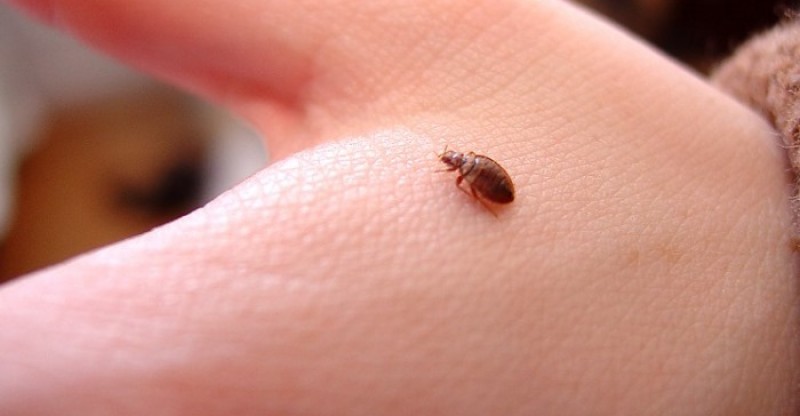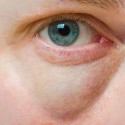40 Science-Backed Treatments to Get Rid of Bed Bug Bites
Have you ever woken up with itchy red bites and wondered where they were coming from?
All too often, these bites are the result of a bed bug infestation.
These small, brown bugs hide in the nooks and crannies of your walls, furniture, and mattress until nightfall, when they descend upon the exposed portions of your body and feed.
While the initial bites are not enough to disturb you from your sleep, the itchy, swollen lesions that follow can be distressing and difficult to treat.
If you are suffering from bed bug bites, the following 40 home remedies will alleviate some of the pain and discomfort.
If you’ve been wondering how to get rid of bed bug bites, we’ve got your answer!
Most remedies consist of simple household staples or otherwise inexpensive antidotes.
What are Bed Bugs?
Bed bugs are flat-bodied, reddish-brown, oval, blood-sucking insects (1).
They feed on the blood of warm-blooded animals, including humans.
Their size and shape allow them to easily hide deep within tight household areas, causing them often to go unseen.
Typically, they only awake during the night to feed.
When feeding, they can attach to a body for anywhere from a few to several minutes.
The resulting lesions are often itchy and painful.
While bed bugs are not known to carry any diseases, scratching the itchy bites can widen and expose them to bacteria and infection.
Many U.S. cities have seen an influx of bed bugs in recent years (2).
In popular areas, bed bugs can easily attach themselves to luggage, clothing, or even bodies, making their transfer as simple as, literally, the drop of a hat.
Even when found, they can be a difficult pest to get rid of.
In large apartment buildings or cluttered homes, it may take months and a fair amount of cooperation to eradicate fully the bed bugs (3).
To make things worse, the bugs and eggs are resistant to many treatments and can go an entire year without feeding which makes them difficult to trap.
How to Prevent Bed Bug Bites
It is extremely difficult to get rid of bed bug bites, as even persistent monitoring and preventive measures cannot completely prevent them from entering your house or apartment.
Due to widespread infestations, many people are asking how to get rid of bed bug bites.
For starters, avoid buying used beds, mattresses, and other furniture.
If you do, inspect them closely for signs of bed bugs.
Furthermore, protect your pre-existing bed and mattress by utilizing a light-colored mattress casing.
When changing your bedding, inspect the casing for reddish-brown stains, cuts, or tears (4).
These are all signs of an active bed bug infestation. Reduce clutter, dust, and grime by vacuuming and cleaning often.
If possible, place bed bug interceptor cups beneath the legs of your bed.
Fill the outer moat with liquid and a few drops of lavender oil.
Be sure to check the moats for trapped deceased bugs, and replace the moat liquid frequently.
Potential Problems Bed Bugs Can Cause
While bed bugs are not known to spread disease, their bites can often become inflamed and itchy.
If a population is allowed to grow, the bites can become an exasperating health issue.
The itchiness alone is enough to cause stress, loss of sleep, and depression.
Excess scratching can also lead to a secondary skin ailment or infection (5).
In addition, many people develop anxiety and phobias of their own living space.
And noticeable bites can cause social discomfort and embarrassment.
Regardless of popular belief, bed bugs do not discriminate based on cleanliness.
Therefore, bed bug infestations can take place in posh hotels, homeless shelters, and everywhere in between.
In crowded cities and tenement buildings, controlling an infestation is extremely difficult.
Bugs can flee a treated apartment, only to return stronger than before.
It is important for individuals to recognize the signs and symptoms of a bed bug infestation, and work diligently to purge their home of the pests (6).
While there is often a stigma attached to bug infestations, it is important to be open and honest about bed bugs.
It can take months or even years to eradicate a population completely.
Discard potentially infested furniture and keep your landlord, neighbors, and visitors informed.
If you are unsure if there are bed bugs in your living space, but are developing red, itchy bites at night, look for the signs of bed bugs and call an exterminator immediately.
Home Remedies for Bed Bug Bites
Baking Soda
Baking soda can be used in a variety of ways to reduce itching and irritation from bed bug bites (7).
Plus, baking soda is an inexpensive, nontoxic, wholesome ingredient that can be added to water to create soothing baths and pastes.
Apple Cider Vinegar
Apple cider vinegar offers the magical healing properties of fruit fermentation.
It is scientifically proven to be antiseptic, anti-itch, and anti-inflammatory (8).
While any apple cider vinegar will do, an organic, mother-containing brand is preferred.
Apple cider vinegar can be applied directly to bites.
Dab it on or soak a small cotton ball and hold it in place with medical tape or a waterproof band-aid.
Rinse off the astringent with soap and water to avoid drying out the area.
Witch Hazel
Witch hazel is a traditional, plant-derived skin astringent (9).
It is scientifically proven to possess strong anti-inflammatory qualities, but is not harsh or drying (10).
It can be typically found in the skincare department of your local supermarket.
If you’re looking for a way to use up the extra, it also makes a wonderful skin toner or aftershave.
Tea Tree Oil
The oil that is expelled from this native Australian plant is well known for its positive results as a topical skin lubricant.
While bed bugs are not known to spread disease, tea tree oil is known to reduce histamine-induced skin inflammation (11).
Carefully massage a diluted solution of tea tree oil and water into the bite location, or apply with a cotton swab.
Leave overnight and reapply throughout the day for continued relief.
The oil has a number of healing properties in addition to being antifungal, antiseptic, and anti-itch.
A note of caution: pregnant and lactating women should avoid using tea tree oil.
Moreover, while the oil is deemed safe for topical application, caution should be used when handling around babies and children.
It should never be consumed.
Lavender Oil
Lavender is a wonderful essential oil for those suffering from bed bug bites and/or an infestation.
This plant-based oil is all-natural, smells pleasant, and has the power to soothe and repair bed bug-bitten skin.
It also is known to be one of the few natural bed bug deterrents.
Furthermore, the use of this herb dates back to ancient times as a source of relief for restlessness and anxiety (13).
Lavender is a powerful, yet subtle herb that can be combined with other natural remedies to create a robust herbal tincture.
Look for the essential oil at your local health food store.
Chamomile
Bed bug bites can often lead to increases in the body’s histamine levels.
Raised by stress and inflammation, this can make those itchy bug bites even worse.
Try drinking a calming cup of chamomile tea and then take the still-warm tea bag and apply it directly to a bite.
Chamomile is just one of several herbal extracts that have been used for centuries to treat dermatological issues topically (14).
You can also create a soothing rub by combining loose chamomile and water.
Use a food processor to pulverize the herbs, and then apply directly to bed bug bites.
Kidney Bean Leaves
This next remedy may be difficult to come by, but kidney bean leaves have long been used to trap bed bugs, preventing their bites before they occur.
The small hooked hairs of the leaves trap and pierce the live bugs in place and can then be discarded (15).
In the meantime, clean your pre-existing bug bites, treat them with a natural solution, and let your mind and body rest.
If kidney bean leaves are too difficult to find, bed bug inceptor cups provide a safe alternative.
Give these traps a more natural feel by filling the moat with water, alcohol, and essential oils.
While it won’t provide any immediate relief to your pre-existing bug bites, it will give you the sense of security you more than likely need to get a good night sleep.
Rubbing Alcohol
Alcohol is a safe, natural solution for disinfecting bed bugs.
It can also be used to dilute natural oils for easier, safer distribution on the surface of the skin (16).
Persistent scratching of a bite can lead to painful inflammation and infection.
Alcohol is a cheap, reliable solution.
Just be careful not to overuse this solution, as rubbing alcohol can actually dry out bites, making them even itchier than before!
Garlic
From full cloves to essential oil, there are plenty of ways to utilize the natural power of garlic.
It has strong antibiotic and antioxidant properties and is known to promote smoother, faster healing (17).
If you don’t want to rub garlic on your skin, eating it can be just as beneficial.
Remove the skin from an organic garlic clove and cut in half.
Next, rub the bed bug bite with the juicy side of the clove. Occasionally, garlic will sting when applied.
Menthol
Herbal balms or even toothpaste containing menthol can provide immediate relief to burning, itching bites (18).
For bites that have developed into wounds, this treatment may be a bit too harsh.
Dab on, allowing to dry for around ten minutes, and then remove with a warm, moist cloth.
This treatment is inexpensive and can be used multiple times a day.
Calendula Salve
Calendula is a common ingredient in over-the-counter salve and is one of the most powerful herbs for soothing insect bites or stings.
It is derived from pot marigold and is native to the Mediterranean climate (19).
While it is approved in many European countries for medicinal use, its full advantages are somewhat mysterious.
For many, the soothing properties of calendula salve are indisputable.
Cucumber
We’ve all seen the advertisement spa images of women wearing bathrobes with cucumbers on their eyes, but there is nothing counterfeit about the soothing, cooling properties of this common salad ingredient.
For the best results, slice a cucumber into quarter-sized discs and refrigerate overnight.
Then, place the cooled cucumber on the bed bug bites.
Cucumbers are a centuries-old traditional vegetable cure in Indian households.
They soothe irritation, reduce swelling, and can even remove germs and bacteria from infected bites (20).
Cucumber is mild and can be combined with any number of other remedies to help ease the discomfort of bed bug bites.
Honey
Who knew that the byproduct of one insect could go so far in healing the bite of another?
The use of honey to heal and treat wounds dates back to ancient times.
Its benefits are numerous, including disinfecting, hydrating, soothing, and stimulating the growth of new skin cells (21).
Unpasteurized honey may contain bacteria. Nevertheless, honey is one of the oldest wound dressings known to mankind.
Calamine Lotion
Calamine lotion is a popular remedy for poison ivy and insect bites because of its ability to eradicate itch quickly and soothe inflamed skin.
It is made from a combination of zinc oxide and ferric oxide (22).
Safe to use while pregnant and with minimal side effects, calamine is a great, affordable topical solution for bed bug bites.
Of course, many detest the messy aftermath of this pink household staple.
Nevertheless, it can be applied several times throughout the day and is scientifically proven to treat bed bug symptoms, such as soreness, redness, and itchiness (23).
Apply calamine to a clean, dry bed bug bite for immediate relief.
H20
If you’ve already exhausted your supply of herbal and home remedies for bed bug bites, don’t overestimate the healing, soothing quality of plain old water (24).
Consider drawing a lukewarm bath to soothe bites covering the whole body, or saturate a clean washcloth with warm water and apply directly to the bite.
You may be surprised at how quickly your skin will go back to feeling like normal.
Aloe Vera
The Aloe Vera plant works wonders when applied to dry, wounded, or irritated skin (25).
This tropical plant has been used for thousands of years to treat skin ailments.
Studies show that when aloe vera cream or gel is applied regularly to damaged skin, the area heals quicker than usual.
Among other things, aloe vera features antibacterial, antifungal, and antiseptic qualities.
Aloe vera plants are easy to maintain.
Moreover, the leaves are commonly found in the Caribbean and specialty drug stores.
While aloe vera gel often contains questionable additives, the leaves can be cut and applied directly to the bite.
The leaves are long, pointed, and green. When cut or broken, they reveal a slimy, transparent gel.
If you’re wondering how to stop bed bug itch, this is your answer!
Preparation H
Preparation H is a popular over-the-counter hemorrhoid cream that contains the active ingredient, Phenylephrine, which is often used as vasoconstrictor and decongestant.
It rapidly reduces the swelling caused by hemorrhoids and provides almost immediate relief.
When applied to bug bites, including bed bug bites, it has nearly the same results (26).
This cream can be applied directly to the bite, but should only be used for a limited period.
Lemon or Lime
Both limes and lemons produce an antibacterial juice (27).
This juice can be applied directly to bed bug bites to fend off infections and inflammation caused by bacteria.
Beware, lemon juice does sting when applied directly to an open wound.
In addition, it can lead to severe sunburn when exposed to sunlight.
Apply the juice to the bites, allow to dry, and then rinse with soap and water for best results.
Another great way to get the nutrient-rich benefits of lemon juice is to apply a lemon wedge or rind directly to a bite.
Dab the wedge to release the juices and discard.
Spoon
If you’re one of the clever women who carry a spoon in your makeup case, you probably already know the soothing power of a warm spoon.
For those who don’t, a slightly heated stainless steel spoon can help reduce inflammation, itchiness, and pain when applied directly to a bug bite.
While there aren’t many studies behind the arm spoon theory, metal spoons are great heat conductors, are smooth to the touch, sanitary, and are easy to hold and apply to small bites.
Basil Leaf
Basil is yet another herbal remedy that can soothe bug bites, along with a variety of other skin ailments (28).
Typically known as a flavoring agent, basil can be safely applied to the skin to help heal insect wounds.
Combine fresh basil leaves and water in the food processor to create a soothing puree that can be applied directly to a bug bite.
Peppermint Oil
Unlike smelly chemical or medicinal salves, peppermint offers a fresh and welcome aroma that is complemented by its ability to cool, heal, and repel bed bugs.
Whether you prepare a skin ointment from crushed leaves, utilize an essential oil, or add it as a sweet-smelling additive to a homemade skin salve, peppermint provides cooling, anti-itch coverage to the most stubborn bed bug bites (29).
Peppermint, along with lavender, basil, and even aloe vera, can be grown in pots inside your home.
Consider growing a “medicine” garden, and combine various plants to create personalized bed bug bite remedies!
Salt
We’ve all heard the old saying, ‘Don’t add salt to the wound.’
However, salt, and in particular sea salt, can serve as a natural astringent, which helps the skin to contract and, therefore, heal more rapidly from bed bug bites.
Add a cup full of sea salt to your next bubble bath to create a peaceful, healing sabbatical from your bedbug-ridden life.
It will also help to soften your entire body’s skin and expel harmful toxins and dead derma.
Lemon Balm
Lemon balm is not to be confused with its citrusy namesake.
This plant is a leafy perennial herb that closely resembles mint.
When applied topically, lemon balm demonstrates pain-reducing properties. Moreover, it is shown to reduce anxiety and insomnia.
Therefore, if you’re looking for an effective remedy for bed bug bites and other related issues, lemon balm is an all-natural, plant-based solution that smells excellent.
Zyrtec or Claritin
Bug bites cause a spike in histamine, therefore common treatment can involve prescribing or advising the use of an antihistamine (30).
Zyrtec and Claritin are over-the-counter drugs that are commonly used for seasonal allergies.
While medicines such as Benadryl can also reduce histamines, they often lead to drowsiness and are not always safe to consume.
Tea Bags
Through osmosis, tea bags have the ability to withdraw toxins from infected bites.
Moreover, many types, including green, black, and pomegranate teas, contain beneficial polyphenols (31).
These helpful elements possess anti-inflammatory characteristics. Tea bags should only be applied to bed bug bites after they are thoroughly cooled.
Save spent tea bags and place them in the refrigerator for the perfect bug bite patch.
If you’re looking for a low-maintenance answer to how to stop bed bug itch, recycled tea bags are it.
Milk
A mixture of equal parts milk and water can be applied directly to bug bites to reduce itchiness and swelling and minimize inflammation.
Milk’s rich proteins help to strengthen the skin.
In addition, the alpha hydroxy acid, which is often used in cosmetic skin procedures, helps to rid the skin of old, dead tissue to make way for new, healthy skin cells.
Sugar
Sugar cubes are an old-fashioned remedy for drawing out the toxins from a bee or wasp sting (32).
Now, companies even market Band-Aid-like patches that contain membranes loaded with sugar crystals.
The patches promise to provide relief from pain and swelling within a half hour.
You don’t need a commercial patch to get immediate relief from your bed bug bites.
Simply crush a sugar cube and place in a moist towel on top of a bite.
Potato
While there isn’t much science behind it, many people swear by the potato remedy for bug bites.
Simply cut the potato into centimeter-wide discs and place them on top of an irritated bug bite.
Use medical tape to secure in place and leave for a half hour.
When you remove this inexpensive remedy, expect to see reduced swelling, redness, and itchiness.
Homemade Rub
Baking soda-based homemade rubs can be upgraded with a few drops of essential oil.
Peppermint, lavender, tea tree, and other herbal scents provide aromatherapy in addition to their healing properties.
Take the scrub into the shower and rub gently into bites.
Let it linger on your skin for a few minutes before rinsing with soap and water.
If you can’t decide how to treat bed bug bites, this is a great way of combining remedies!
Aspirin
Aspirin is a common medicine cabinet staple.
The small pills are typically taken to relieve pain, headache, fever, or inflammation (33).
It can also be crushed up and combined with a little water to create an inexpensive and effective anti-itch cream.
Use a Q-tip or other applicator to apply and cover with a small Band-Aid to prevent the medicine from smearing.
Banana Peel
One of the strangest bed bug bite treatments, banana peel actually provides significant relief.
Banana peels contain several healing compounds, such as carotenoids and polyphenols (34).
These compounds provide surprisingly instant relief from itching and inflammation.
Moreover, they help speed up the healing process.
To give this remedy a try, take the inside of a banana peel and rub it against a bed bug bite.
Repeat as necessary.
Onion
Yet another edible bed bug bite treatment, the yellow onion provides relief from pain, inflammation, and even itchiness.
While your coworkers might not appreciate your doing this, taping an onion to a bothersome bite is an inexpensive and impactful way to reduce discomfort.
The sulfur in the onion helps to neutralize the itch-causing chemicals, at least temporarily.
The same onion can be reused multiple times. Just be sure to label it properly, and refrigerate it between uses.
Tobacco
While we don’t recommend smoking tobacco, this ancient plant possesses a mild analgesic (37).
Dampened chewing or loose-leaf tobacco can be applied directly to a bed bug bite to provide immediate pain relief.
Spray Deodorant
Spray or bar deodorant that contains aluminum chloride will work to draw out toxins from bed bug or other insect bites (38).
If you’re looking for a mess-free way to cause constant itch or inflammation to subside, look to your favorite antiperspirant!
Heat
Heat can provide soothing relief and prevent you from scratching itchy bites.
Add a few drops of peppermint or lavender oil to dried rice, and place inside of a clean cotton sock.
Heat for 30 seconds in the microwave. Apply this aromatic bundle to itchy bites.
The warmth will help open pores and remove toxins from the bite.
White Clay
White cosmetic clay is a popular remedy for bed bug bites. In fact, it is even sometimes sold as “bed bug powder.”
While you may be lucky enough to find this in a brick-and-mortar store near you, it can be purchased easily online.
Mix the cosmetic clay with lukewarm water to form a smooth paste, and apply it to all bug bites.
Let the paste dry, and then rinse clean with lukewarm water.
Natural clay has antiseptic properties (40).
Plantain
Don’t confuse this leafy plant with the banana lookalike.
The plantain leaf is an extremely common backyard weed.
Although it is typically seen as a nuisance to landscapers, this wild herb has several healing properties.
Native Americans used the crushed leaves of the plantain plant to help heal poison ivy rash, insect bites, and stings (41).
Mouthwash
Mouthwashes that contain ethanol and peppermint offer antiseptic and healing properties.
While the ethanol helps to pull the toxins out of the bug bite, peppermint works to soothe the itch.
Dab on, or soak a cotton ball in the mouthwash and adhere it to the abrasion with a Band-Aid or medical tape.
Soap and Water
Frequently-itched bed bug bites can develop into a minor infection.
Wash your bites with a mild antiseptic soap and warm water to prevent the infection’s spread (42).
Ice
Apply ice to your bed bug bites to soothe sore, stinging nerve endings instantly.
This will give you a much-needed break from itching, and provide unmatched relief without the use of harsh chemicals (43).
Use a lunch box ice pack, or a place a few ice cubes in a plastic baggy and wrap the frozen parcel in a face cloth or dish rag.
Apply it directly to the bite.
Do’s and Don’ts
Do’s
- Clean and declutter your home or apartment, searching for signs of bed bugs.
- Seek professional assistance in identifying a bed bug infestation.
- Consult with your landlord, other tenants, or city databases to identify existing bed bug infestations in your building.
- Remove your bedding and wash on high heat for at least 120 minutes.
- Cover your mattress in a high quality, insect-proof mattress protector. Check the protector periodically for signs of bed bug feces, rips, or tears.
- Place bed bug inceptors below your bed posts. Check and empty traps at least once a week.
- Apply safe, herbal treatments to your skin to reduce inflammation and itchiness, and to promote rapid healing.
- Consult with a medical professional if bites become inflamed or infected.
- Actively pursue bed bugs, and collaborate with your neighbors to ensure your efforts are not in vain.
- Try your best to get an adequate amount of sleep, and participate in stress-reducing activities whenever possible.
Don’ts
- Do not purchase used furniture. If you do, thoroughly investigate for signs of bed bugs.
- Don’t itch your bed bug bites. Inching can lead to wider lesions, and promote the spread of infection-causing bacteria.
- Don’t attempt to use over-the-counter insecticides or bug bombs. Bed bug populations are resistant to many of these products, which are highly toxic and harmful to humans.
- Don’t toss your furniture. While bed bugs can easily penetrate mattresses, throwing out your old one won’t eradicate them, and constantly replacing furniture is costly and counterproductive.
- Don’t lie about your infestation. Many people are ashamed to have bed bugs, but these pests don’t discriminate.
- Don’t relocate without addressing the issue. Bed bugs can travel miles on clothing, skin, or furniture. No amount of moving will leave them behind.
- Don’t move furniture. If your bed bug problem is isolated to your bedroom, moving things throughout your house could make it a bigger issue.
Conclusion
There is nothing worse than waking up to a series of painful, itchy bites, only to realize that the mite that has been sinking its teeth into you is the elusive bed bug.
Bed bugs infestations are becoming more and more prevalent, and are among some of the hardest insects to eradicate.
They are small, flat, and only active at night, making them difficult to catch a glimpse of, let alone kill.
Moreover, the bites, which come as a result of an extended feeding, can be unbearably itchy and often lead to widespread inflammation and discomfort.
Fortunately, there are a number of helpful home remedies for bed bug bites that you can utilize to speed their healing.
From essential oils to reimagined drugstore creams, our long list of home remedies will provide you with much-needed relief without breaking the bank.
It will also help minimize that undying itch so that you can concentrate on eradicating your bed bugs for good.
Are you or someone you know looking for how to treat bed bug bites?
If so, did they utilize home remedies? Tell us about it in the comments below.
FDA Compliance
The information on this website has not been evaluated by the Food & Drug Administration or any other medical body. We do not aim to diagnose, treat, cure or prevent any illness or disease. Information is shared for educational purposes only. You must consult your doctor before acting on any content on this website, especially if you are pregnant, nursing, taking medication, or have a medical condition.
HOW WOULD YOU RATE THIS ARTICLE?





